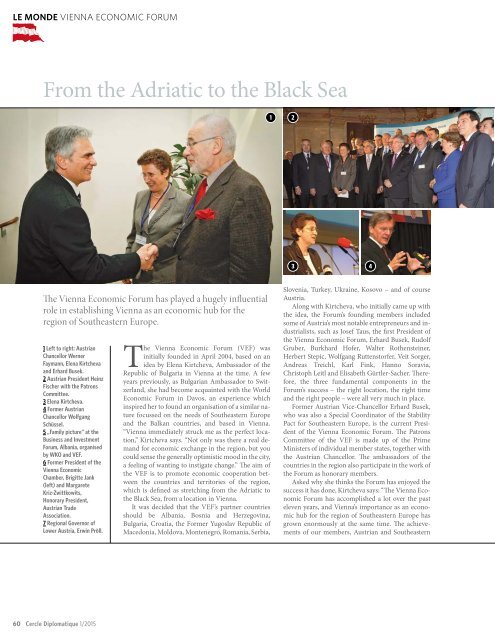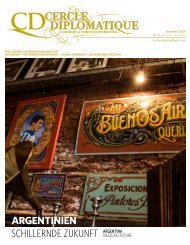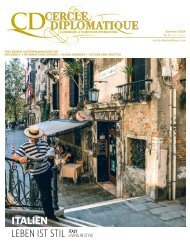IRAK DIE WIEGE DER ZIVILISATION
You also want an ePaper? Increase the reach of your titles
YUMPU automatically turns print PDFs into web optimized ePapers that Google loves.
LE MONDE VIENNA ECONOMIC FORUM<br />
From the Adriatic to the Black Sea<br />
Text: Petra Stix<br />
INFO<br />
1 2<br />
5 7<br />
VEF Events in 2015<br />
27th-28th May 2015:<br />
“Vienna Economic<br />
Talks – Tirana Meeting.<br />
Brainstorming Regional”,<br />
in Tirana, Albania<br />
3 4<br />
18th June 2015:<br />
“Vienna Economic<br />
Talks – Meet Macedonia in<br />
Vienna”, Studio 44 of the<br />
Austrian Lotteries,<br />
Rennweg 44, 1030 Vienna<br />
The Vienna Economic Forum has played a hugely influential<br />
role in establishing Vienna as an economic hub for the<br />
region of Southeastern Europe.<br />
1 Left to right: Austrian<br />
Chancellor Werner<br />
Faymann, Elena Kirtcheva<br />
and Erhard Busek.<br />
2 Austrian President Heinz<br />
Fischer with the Patrons<br />
Committee.<br />
3 Elena Kirtcheva.<br />
4 Former Austrian<br />
Chancellor Wolfgang<br />
Schüssel.<br />
5 „Family picture“ at the<br />
Business and Investment<br />
Forum, Albania, organised<br />
by WKO and VEF.<br />
6 Former President of the<br />
Vienna Economic<br />
Chamber, Brigitte Jank<br />
(left) and Margarete<br />
Kriz-Zwittkowits,<br />
Honorary President,<br />
Austrian Trade<br />
Association.<br />
7 Regional Governor of<br />
Lower Austria, Erwin Pröll.<br />
The Vienna Economic Forum (VEF) was<br />
ini tially founded in April 2004, based on an<br />
idea by Elena Kirtcheva, Ambassador of the<br />
Republic of Bulgaria in Vienna at the time. A few<br />
years previously, as Bulgarian Ambassador to Switzerland,<br />
she had become acquainted with the World<br />
Economic Forum in Davos, an experience which<br />
inspired her to found an organisation of a similar nature<br />
focussed on the needs of Southeastern Europe<br />
and the Balkan countries, and based in Vienna.<br />
“Vienna immediately struck me as the perfect location,”<br />
Kirtcheva says. “Not only was there a real demand<br />
for economic exchange in the region, but you<br />
could sense the generally optimistic mood in the city,<br />
a feeling of wanting to instigate change.” The aim of<br />
the VEF is to promote economic cooperation between<br />
the countries and territories of the region,<br />
which is defined as stretching from the Adriatic to<br />
the Black Sea, from a location in Vienna.<br />
It was decided that the VEF’s partner countries<br />
should be Albania, Bosnia and Herzegovina,<br />
Bulgaria, Croatia, the Former Yugoslav Republic of<br />
Macedonia, Moldova, Montenegro, Romania, Serbia,<br />
Slovenia, Turkey, Ukraine, Kosovo – and of course<br />
Austria.<br />
Along with Kirtcheva, who initially came up with<br />
the idea, the Forum’s founding members included<br />
some of Austria’s most notable entrepreneurs and industrialists,<br />
such as Josef Taus, the first President of<br />
the Vienna Economic Forum, Erhard Busek, Rudolf<br />
Gruber, Burkhard Hofer, Walter Rothensteiner,<br />
Herbert Stepic, Wolfgang Ruttenstorfer, Veit Sorger,<br />
Andreas Treichl, Karl Fink, Hanno Soravia,<br />
Christoph Leitl and Elisabeth Gürtler-Sacher. Therefore,<br />
the three fundamental components in the<br />
Forum’s success – the right location, the right time<br />
and the right people – were all very much in place.<br />
Former Austrian Vice-Chancellor Erhard Busek,<br />
who was also a Special Coordinator of the Stability<br />
Pact for Southeastern Europe, is the current President<br />
of the Vienna Economic Forum. The Patrons<br />
Committee of the VEF is made up of the Prime<br />
Ministers of individual member states, together with<br />
the Austrian Chancellor. The ambassadors of the<br />
countries in the region also participate in the work of<br />
the Forum as honorary members.<br />
Asked why she thinks the Forum has enjoyed the<br />
success it has done, Kirtcheva says: “The Vienna Economic<br />
Forum has accomplished a lot over the past<br />
eleven years, and Vienna’s importance as an economic<br />
hub for the region of Southeastern Europe has<br />
grown enormously at the same time. The achievements<br />
of our members, Austrian and Southeastern<br />
PHOTOS: VEF<br />
6<br />
European companies and international firms, in helping<br />
the region of Southeastern Europe from Vienna,<br />
really speak for themselves.”<br />
The Vienna Economic Forum’s main conferences<br />
are held in the Austrian capital every year in November.<br />
The conferences are attended by hundreds of<br />
decision-makers from business and industry, who<br />
come together to exchange ideas and to network. In<br />
addition to this, the VEF organises a number of<br />
external conferences each year in the capital cities of<br />
its partner countries, under the patronage of the<br />
prime minister in question.<br />
Another initiative, the “Vienna Economic Talks”,<br />
provides a platform for discussing specific issues or<br />
economic sectors within a smaller framework. In<br />
2008, the “Vienna Economic Talks – Pleven Meeting”<br />
was organised to discuss the issues of water<br />
supply, waste management and infrastructure.<br />
The 11th Forum was held in Vienna in November<br />
2014. 500 participants from 44 countries attended<br />
the event, including Austrian President Heinz<br />
Fischer, Chancellor Werner Faymann, and the<br />
President of the European Bank for Reconstruction<br />
and Development, Suma Chakrabarti.<br />
Elena Kirtcheva is also particularly proud of the<br />
fact that the VEF was awarded NGO status in 2011,<br />
and that it now enjoys Special Advisor status at the<br />
Economic and Social Council of the United Nations.<br />
One particularly popular event in the Vienna<br />
Economic Forum calendar is its annual garden party<br />
every summer. “The unique atmosphere of this event<br />
proves once again just how much the people of this<br />
region, from the Adriatic to the Black Sea, have in<br />
common with one another,” Kirtcheva says.<br />
The Vienna Economic Forum is continuously<br />
growing and evolving, a trend reflected in the ongoing<br />
internationalisation of its Executive Board.<br />
One Belgian, two Bulgarian and one German company<br />
are now represented on the Board, as well as the<br />
Turkish Investment Agency. “We are firmly convinced<br />
that the presence on the Board of the VEF of<br />
representatives of companies from all member countries<br />
heightens economic collaboration across the<br />
region as a whole,” Kirtcheva says.<br />
Playing such a key role in the region of Southeastern<br />
Europe for almost eleven years, and continuing<br />
to establish Vienna’s place as an economic hub, is a<br />
hugely positive feeling, of course, and Kirtcheva is<br />
optimistic about the future. “Advancing the region’s<br />
economic development and witnessing so many success<br />
stories – initially those of the Austrians, and as<br />
time has gone by, those companies we have had the<br />
chance to accompany in partner countries as well –<br />
provides enormous motivation and impetus.”<br />
9th June 2015:<br />
14th Traditional Garden<br />
Party of the Vienna<br />
Economic Forum, Haus<br />
Wittgenstein, Parkgasse<br />
18, 1030 Vienna<br />
23rd November 2015:<br />
12th Vienna Economic<br />
Forum – Vienna Dialogue<br />
2015, Palais Niederösterreich,<br />
Vienna<br />
INFO:<br />
www.vienna-economicforum.com<br />
60 Cercle Diplomatique 1/2015<br />
Cercle Diplomatique 1/2015<br />
61

















